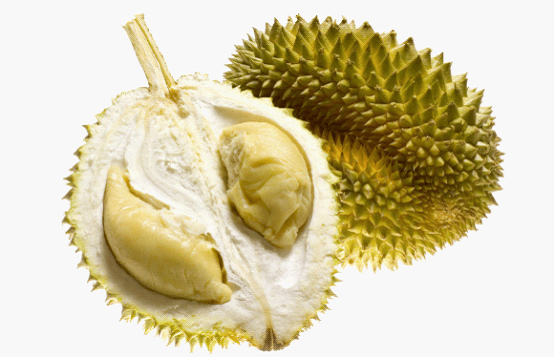Durian is a giant tropical evergreen tree. The leaves are long and oval with a pointed tip, and it has umbellate inflorescences with pale yellow flowers. The fruit is the size of a soccer ball, with a solid skin densely covered in triangular spines. The flesh consists of pulp formed from the false pericarp, is a light yellow color, sticky, and juicy, making it a fruit of great economic value.
Traditional Chinese medicine considers durian to have a spicy and sweet warm nature, entering the liver, kidneys, and lungs. It is suitable for those with a cold constitution. It is recommended for recovery after illness and for women postpartum to nourish the body. Durian has a warming nature, can invigorate blood circulation, dispel cold, and alleviate menstrual cramps, making it especially suitable for women suffering from period pain. It can also improve symptoms of abdominal coldness and help raise body temperature, making it an ideal supplement for those with a cold body constitution. Durian is highly nutritious, and regular consumption can strengthen the body, benefit the spleen and qi, nourish the kidneys and enhance vitality, and warm the body.
Although durian is most renowned in Thailand, hailed as the “king of fruits,” it has many benefits but also has a very unique taste that deters many people due to its warming nature and some side effects.
(1) Overeating can lead to difficulty breathing, flushed face, and gastric distension.
(2) Durian is famously known in Dalian as the “flight attendant killer.” Its strong odor is praised by lovers but resented by haters, which is why it is not allowed in hotels, trains, airplanes, and public places.
(3) Although durian is rich in fiber, it expands by absorbing water in the gastrointestinal tract; excessive consumption can block the intestines and lead to constipation.
(4) Cancer patients or those recovering should be extra cautious, as indulging in it could worsen their condition.
Additionally:
1. Durian should not be consumed with alcohol: both durian and alcohol are considered hot and dry substances. For diabetic patients, consuming both can lead to vascular obstruction, and in severe cases, could result in blood vessel rupture or stroke. It is not advisable to consume together.
2. Those with a hot constitution, sore throats, coughs, colds, yin deficiency, or sensitive airways should avoid durian, as it can worsen their condition and is not beneficial for health.
3. Traditional Chinese medicine suggests that durian has a warm nature; if consumed excessively, it can cause rising “dry heat” and symptoms of damp toxicity. To alleviate discomfort, one should drink kelp and mung bean soup or summer grass herbal soup.
4. Durian contains high levels of calories and sugar; thus, overweight individuals and diabetic patients should consume it in moderation or avoid it altogether.
5. Durian is high in potassium, so patients with kidney or heart diseases should eat it sparingly.
6. Durian should not be eaten in large quantities at once. If it has an alcoholic smell when ripe, it indicates it has spoiled and should not be eaten.
If one accidentally consumes too much durian resulting in internal heat phlegm, difficulty breathing, flushing, and gastric distension, one should immediately eat a few mangosteen fruits to resolve the issue, as mangosteen is extremely cold and can counteract durian’s heat. Only the queen of fruits can subdue the king of fruits. One can also use durian peel boiled with salt water for relief.
Therefore, although durian has many benefits, it also has certain side effects. We should consume it in moderation. Moreover, after eating durian, it is advisable to drink plenty of water or consume other juicy fruits, as one may feel dry after eating durian, which can help alleviate the dryness and heat.


